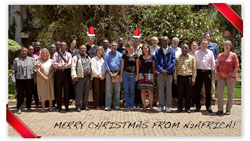N2Africa Podcaster 17
December 2012
|
| Title |
Summary |
Newsletter item # |
| Introduction |
|
Update on the recent learning lunch in which the progress of the project was discussed.
Thanks to all and best wishes for the festive season.
Right: A slide of the presentation based on the most recent information, showing numbers of farmers reached after 3 years of activities across the eight countries
|
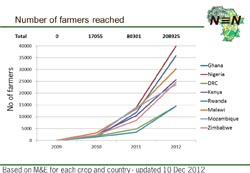 |
|
1 |
| Impressions from the project coordinator of his visits to the countries where N2Africa is implemented |
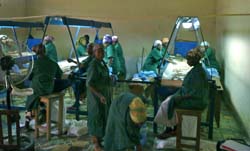 |
On Sunday December 9th I returned from my visit to N2Africa Mozambique, the last leg of a trip that took me to all of the eight countries where the N2Africa project is implemented (excluding those countries that are serviced by the supplementary grant). Western Kenya, Nigeria, Ghana, Rwanda, Democratic Republic of Congo, Malawi, Zimbabwe and Mozambique were visited.
Photo: The women from IKURU ltd. (a partner in the N2Africa project Mozambique) sorting the groundnuts to get first grade groundnuts for export to the Netherlands
|
|
2 |
| N2Africa-ADVANCE partnership enhances soyabean-rhizobium inoculants technology dissemination – Part 1 |
|
In Ghana, the N2Africa project primarily seeks to promote the production and productivity of soyabean, cowpea and groundnut in the northern sector of the country. Various partners engage in establishing demonstration plots evaluating the use of rhizobium inoculants and phosphorus fertilizer (TSP and/or murriate of potash) and in some cases also nitrogen fertilizer (Urea). ...
This is part 1 of a series of 2. The next one will be puclbished in the next Podcaster.
Photo: Testing whether a simple planter could sow inoculated seed without removing the inoculants from the seed surface
|
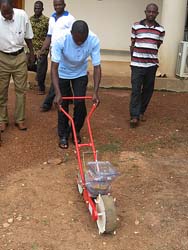 |
|
3 |
| Legumes varietal selection is critical for effective marketing: Case study for Mudzi and Guruve districts of Zimbabwe |
|
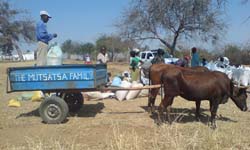
|
The project has been running for two seasons in Zimbabwe. The farmers have gained some commendable knowledge and have benefitted from the technologies. ...
Photo: Here farmers are bringing their produce to the central collection point- notable absence of infrastructure for storage (Picture by Byron Zamasiya)
|
|
4 |
| Soyabean Processing Windfall in West Kenya |
|
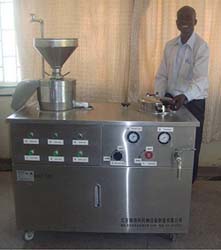
|
One of the larger challenges to those working in program outreach activities is linking "at least half of the farming communities" to legume processing initiatives.
Photo: This state-of-the-art soya milk processor was provided through UNIDO and was installed at one of three factories in west Kenya (photo credit Josephine Ongoma)
|
|
5 |
| Kenyan Farmer Delegation Generates Understanding and Good Will |
|
The N2Africa outreach activities in west Kenya work through 26 grassroots collaborators. This team typically installs 50 BNF technology demonstrations, conducts 25 farmer field days, operates 16 grain legume market collection points and assists the Legume Agronomy team with its on-farm experiments twice a year, owing to our bimodal rains. ...
Photo: The farmer delegation visits the MEA factory in Nakuru where Sympal is blended (photo credit Moses Chamwada)
|
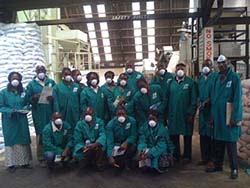 |
|
5 |
|
|
The Podcaster is published six times per year – we look forward to receiving news and contributions – particularly from partners. Please send in contributions well in time. Contact address for this newsletter is: N2Africa.office@wur.nl
Please feel free to forward this email to colleagues you believe would be interested. This email has been sent to you by N2Africa, funded by The Bill & Melinda Gates Foundation.
When you change your e-mail address and want to keep receiving the Podcaster, please send your new address to N2Africa.office@wur.nl. If friends/colleagues like to receive future Podcasters let N2Africa.office@wur.nl know as well.



